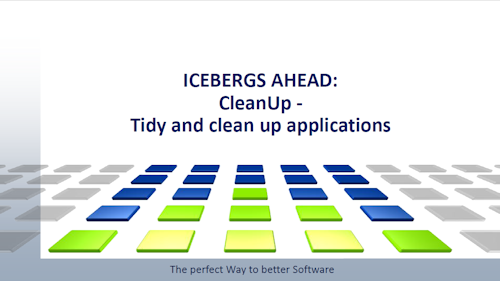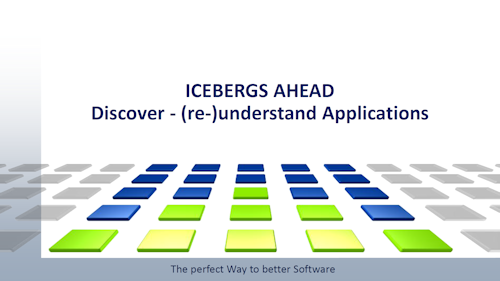
Webinar Part 4: 'ICEBERGS AHEAD: Modernize - Make Applications future-proof!' on May 13th, 2025 at 11:00 a.m. CET.
Looking ahead to Part 4 of the Titanic Webinar Series Analyze - CleanUp - MODERNIZE. Due to the Easter holidays, the next part will happen on May 7th, 2025, at 11:00 AM. In this part, we will introduce you to the concept of the AMELIO Modernization Platform.
A customized factory for modernizing large IT applications. 100% automated and therefore secure, reliable, and error-free. Whether it's architectural transformation, migration, or mass change.
We look forward to your participation.
Come along and book your free ticket directly here:
If you prefer to participate the webinar in german (07.05.2025), register here.
P.S.: If you missed the first part, get the recording here...
Part 3 from March 26th, 2025
Review: Webinar Part 3 'ICEBERGS AHEAD: CleanUp - Tidy and clean up applications!'
On March 26, 2025, at 11:00 a.m., the time had come. Part 3 of our webinar series: "ICEBERGS AHEAD: CleanUp - Tidy and clean up applications!" aired and the list of attendees was impressive.
Icebergs are best avoided, as the Titanic taught us over 100 years ago. There are icebergs in application modernization, too. In the third episode of the webinar "Icebergs Ahead," we showed you how you can safely clean up your applications with us.
 Anyone who thinks that cleanup is just about finding dead code is thinking too narrowly. We'll go further ahead and provide you with a variety of practical options for cleaning up legacy applications and more in advance of the actual modernization and eliminating technical debt.
Anyone who thinks that cleanup is just about finding dead code is thinking too narrowly. We'll go further ahead and provide you with a variety of practical options for cleaning up legacy applications and more in advance of the actual modernization and eliminating technical debt.
Slides and Recording of the Webinar
You were not able to attend?
No Problem: You can request the presentation slides and the Recordings of part 1, part 2 and part 3 here.
Part 2 from January 29th, 2025
Our second webinar 'ICEBERGS AHEAD: DISCOVER – (re)understand applications' took place on January 29th, 2025.
To circumnavigate icebergs, you have to know where they are. The same goes for modernizing applications. For a safe modernization, knowledge about the application is a key factor. You must recognize the following situation: the programmers that originally wrote the COBOL and PL/I applications are not available anymore. The successors, new team or external service providers are responsible for maintenance, modernization or re-implementation. But questions about the legacy applications are often answered with just shrugs.
 Icebergs are not depicted on maps and using a pair of binoculars only makes the 10% above the surface visible. Therefor radar and sonar are needed to safely bypass them. To understand application more than just the documentation is needed. In our webinar we have demonstrated, how AMELIO Logic Discovery regains such knowledge from the program sources in an automated process.
Icebergs are not depicted on maps and using a pair of binoculars only makes the 10% above the surface visible. Therefor radar and sonar are needed to safely bypass them. To understand application more than just the documentation is needed. In our webinar we have demonstrated, how AMELIO Logic Discovery regains such knowledge from the program sources in an automated process.
Slides and Recording of the Webinar
You couldn't attend?
No Problem: You can request the presentation slides and the recording of part 1 and part 2 here.
 Part 1 from November 13th, 2024
Part 1 from November 13th, 2024
Our first webinar 'ICEBERGS Ahead – Software Modernization Made Easily' took place on November 13th, 2024.
Using the story of the Titanic, we showed you how you can deal with today's challenges in application modernization in a relaxed manner and avoid every iceberg.
The first episode of our webinar series on automated software modernization met with great interest. Over 80 interested parties had registered. You couldn't attend? Then you can request the recording here. The second episode in this series will be available at the end of January. The focus will then be on (re-)understanding applications
Slides and Recording of the Webinar
You couldn't attend?
No Problem: You can request the presentation slides and the recording here.
Also read our text series "Iceberg Ahead"
Download Language: Englisch - Version: MT21105.01

In the text series "Iceberg ahead", our colleague Hans Nickessen describes his experiences in dealing with legacy applications.
Read which possibilities there are to realise the added value of a modernisation.
- Part 1: "How you can successfully bring your COBOL or PL/I Applications into the Future without hitting an Iceberg"
- Part 2: "Knowledge Transfer - Securing, Re-understanding, Optimizing and Passing on the Foundation"
- Part 3: "Assessment or how to


